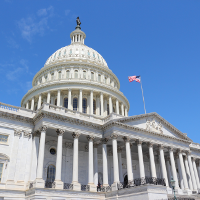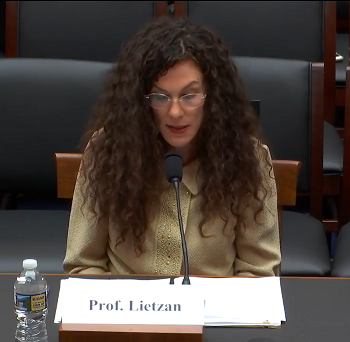 On July 27, 2017, CPIP Affiliate Scholar and Associate Professor of Law at the University of Missouri–Columbia Erika Lietzan testified before the House Judiciary Committee’s Subcommittee on Regulatory Reform, Commercial and Antitrust Law in a hearing on Antitrust Concerns and the FDA Approval Process. The hearing was an attempt by lawmakers to better understand the sometimes complex pharmaceutical development and approval process and to consider legislative tactics that could help curb regulatory abuses in the drug marketplace. Professor Lietzan’s testimony provides her perspective and recommendations on three aspects of the regulatory paradigm of particular interest to the Committee: citizen petitions, use and distribution restrictions, and FDA’s unapproved drugs initiative.
On July 27, 2017, CPIP Affiliate Scholar and Associate Professor of Law at the University of Missouri–Columbia Erika Lietzan testified before the House Judiciary Committee’s Subcommittee on Regulatory Reform, Commercial and Antitrust Law in a hearing on Antitrust Concerns and the FDA Approval Process. The hearing was an attempt by lawmakers to better understand the sometimes complex pharmaceutical development and approval process and to consider legislative tactics that could help curb regulatory abuses in the drug marketplace. Professor Lietzan’s testimony provides her perspective and recommendations on three aspects of the regulatory paradigm of particular interest to the Committee: citizen petitions, use and distribution restrictions, and FDA’s unapproved drugs initiative.
Citizen Petitions
Addressing the first topic, Lietzan praises the development of the citizen petition process, which was initiated in the late 1970s in order to allow any person to request that the FDA issue, amend, or revoke a regulation or order. Though citizen petitions were meant to move the administrative agency towards an “open government” philosophy and embrace transparency, access, and accountability, critics argue that they’ve enabled some innovative drug makers to intentionally delay the approval of generics through frivolous petitions. But as Lietzan points out, many critics’ concerns over meritless innovator petitions are based on inferences and not factual findings.
 Lietzan explains that there is scant factual evidence of delay in the approval of generic drugs due to petitions, noting that of 175 petitions related to pending applications over a recent eight-year period, only five resulted in delays not necessary to protect the public health. Additionally, while two of the most relied upon studies track denied petitions, neither of them evaluate the strength or contents of the petitions. As Lietzan notes, “[t]he claim that petitions are frequently frivolous appears based on the timing of petitions and denial rate, not the substance, of the petitions.”
Lietzan explains that there is scant factual evidence of delay in the approval of generic drugs due to petitions, noting that of 175 petitions related to pending applications over a recent eight-year period, only five resulted in delays not necessary to protect the public health. Additionally, while two of the most relied upon studies track denied petitions, neither of them evaluate the strength or contents of the petitions. As Lietzan notes, “[t]he claim that petitions are frequently frivolous appears based on the timing of petitions and denial rate, not the substance, of the petitions.”
In her recommendations to the Committee, Professor Lietzan suggests enhancing existing empirical work with a robust examination of the agency’s disposition of the issues presented in the petitions, rather than a cursory look at the requests stated in the petitions. In order to help conduct this research, Lietzan recommends providing the agency with additional resources and incentivizing petitioners to include more comprehensive data as part of their submissions.
Use and Distribution Restrictions
Of particular focus during the hearing was the proposed Creating and Restoring Equal Access to Equivalent Samples Act of 2017 (CREATES Act), which aims to prevent drug innovators from using FDA-required risk evaluation and mitigation strategies (REMS)—required for potentially high-risk drugs—to obstruct generic competition. Again, Lietzan points out that the studies relied upon to promote the CREATES Act often involve unclear methodology and weak empirical support.
When dealing with new drugs that may pose great risk to the public, innovators have legitimate concerns about the sale of their products to another company, regardless of a competitive relationship. As Lietzan explains, these innovators have a special responsibility to the public, and the CREATES Act lacks meaningful protections in the event their products lead to toxicity or other harm to patients.
Lietzan then challenges the CREATES Act as “flatly inconsistent with fundamental patent law.” She explains that by requiring a company to practice its patent for the benefit of a competitor, the Act contradicts a central principle of patent law which guarantees that a patent owner has no duty to practice their invention. After she warns that “[e]nacting this provision will inherently devalue patents” and “harm incentives to innovate,” Lietzan asserts that the FDA simply lacks the authority to require a company to practice their patent or sell their product to a competitor.
In lieu of enacting the flawed CREATES Act, Lietzan recommends that robust liability protections be implemented for innovative companies providing products to third parties, and that the agency examine ways to incentivize innovators to manufacture and sell patented drugs, as well as agree to shared access systems.
Unapproved Drugs Initiative
Addressing concerns over recent sharp increases in the price of drugs that have long been available at a low cost, Professor Lietzan explains that—despite public outrage—these price hikes are a direct result of the FDA’s “unapproved drugs initiative” and represent a system working directly as designed. The reality is that there are several thousands of unapproved drugs marketed in the US, which Lietzan explains are the result of piecemeal evolution of drug approval mechanisms throughout the 20th century.
The FDA has adopted a risk-based approach to combating unapproved drugs, prioritizing those that pose the biggest threats to public health while also providing a grace period for some companies to try to bring their products into compliance. But Professor Lietzan notes that in order for many established medicines to obtain approval, companies must generate substantial data and perform research that will inevitably cost a significant amount of money. And while there may not be a way to bring these drugs into compliance without price disruptions, Lietzan recommends the creation of programs in which companies involved with specific ingredients pool resources and collaborate on research, allowing the FDA to save time and money by approving a group of applications at the same time.
Conclusion
Professor Lietzan’s testimony and recommendations reflect the core values of public health and open government embodied in the FDA’s mission of ensuring that pharmaceuticals are safe and effective. In addition, her testimony stresses the importance of maintaining effective patent property rights and promoting evidence-based policymaking—two fundamental principles that are unfortunately often overlooked.
Video of the full hearing can be found here.

